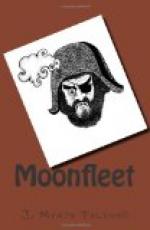The Why Not? was not the real name of the inn; it was properly the Mohune Arms. The Mohunes had once owned, as I have said, the whole of the village; but their fortunes fell, and with them fell the fortunes of Moonfleet. The ruins of their mansion showed grey on the hillside above the village; their almshouses stood half-way down the street, with the quadrangle deserted and overgrown; the Mohune image and superscription was on everything from the church to the inn, and everything that bore it was stamped also with the superscription of decay. And here it is necessary that I say a few words as to this family badge; for, as you will see, I was to bear it all my life, and shall carry its impress with me to the grave. The Mohune shield was plain white or silver, and bore nothing upon it except a great black ’Y. I call it a ‘Y’, though the Reverend Mr. Glennie once explained to me that it was not a ‘Y’ at all, but what heralds call a cross-pall. Cross-pall or no cross-pall, it looked for all the world like a black ‘Y’, with a broad arm ending in each of the top corners of the shield, and the tail coming down into the bottom. You might see that cognizance carved on the manor, and on the stonework and woodwork of the church, and on a score of houses in the village, and it hung on the signboard over the door of the inn. Everyone knew the Mohune ‘Y’ for miles around, and a former landlord having called the inn the Why Not? in jest, the name had stuck to it ever since.
More than once on winter evenings, when men were drinking in the Why Not?, I had stood outside, and listened to them singing ‘Ducky-stones’, or ‘Kegs bobbing One, Two, Three’, or some of the other tunes that sailors sing in the west. Such songs had neither beginning nor ending, and very little sense to catch hold of in the middle. One man would crone the air, and the others would crone a solemn chorus, but there was little hard drinking, for Elzevir Block never got drunk himself, and did not like his guests to get drunk either. On singing nights the room grew hot, and the steam stood so thick on the glass inside that one could not see in; but at other times, when there was no company, I have peeped through the red curtains and watched Elzevir Block and Ratsey playing backgammon at the trestle-table by the fire. It was on the trestle-table that Block had afterwards laid out his son’s dead body, and some said they had looked through the window at night and seen the father trying to wash the blood-matting out of the boy’s yellow hair, and heard him groaning and talking to the lifeless clay as if it could understand. Anyhow, there had been little drinking in the inn since that time, for Block grew more and more silent and morose. He had never courted customers, and now he scowled on any that came, so that men looked on the Why Not? as a blighted spot, and went to drink at the Three Choughs at Ringstave.




